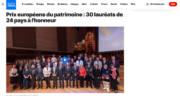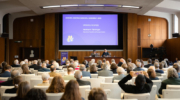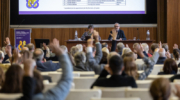Renowned historian Orlando Figes delivers fascinating Europa Nostra Lecture on the genesis of European culture in the 19th century
As part of the European Heritage Policy Agora 2025, held on 15 October at the Zweig Visitor Centre of the European Parliament in Brussels, Europa Nostra was delighted to host a lecture by the renowned historian Orlando Figes, who spoke about the cultural history of 19th-century Europe, drawing on his acclaimed book “The Europeans: Three Lives and the Making of a Cosmopolitan Culture”.
Synopsis of the book
“The Europeans” explores the interconnected lives of three influential figures: Pauline Viardot-Garcia, a celebrated French Spanish mezzo-soprano and composer; her husband, Louis Viardot, an art critic and translator; and the Russian novelist Ivan Turgenev. Through their personal and professional relationships, Figes examines how artistic and cultural exchanges shaped a shared European cultural landscape. The book highlights the role of technological and legal developments, such as the printing press, railways and copyright law in enabling artists to reach wider audiences and sustain their work.
Highlights from the lecture
During the lecture, Figes emphasised how culture has historically facilitated dialogue and mutual understanding across diverse communities in our continent. He highlighted Pauline Viardot-Garcia’s independence as a woman and as an artist and her contributions to European cultural life.

Figes also explored three key developments that influenced artistic expression and the dissemination of culture in the 19th century:
- Printing press: Mass production of images and texts allowed wider access to art and knowledge.
- Railways: Improved connections between cities enabled performances and publications to reach broader audiences, reshaping patterns of cultural engagement.
- Copyright laws: Legal protections supported artists in earning a living from their work and encouraged sustainable creative practices.
The lecture drew parallels between historical challenges and contemporary issues, including piracy and the impact of artificial intelligence on creative work nowadays. Figes stressed the importance of protecting cultural heritage, advocating for coordinated action by governments and the European Union to support artists and cultural institutions.
Reflections on cultural exchange
Orlando Figes’ lecture offered an insightful perspective on how cultural exchange has historically connected communities across borders and continues to shape European cultural life today, while underscoring the urgent need to protect, support, and prioritise culture in the modern era.
He emphasised that culture is the foundation of democracy, fostering dialogue, understanding, and a shared sense of identity. “Europe cannot be reduced to a market alone; the vibrancy and sustainability of its cultural life are essential to preserving its identity,” he stated.

Orlando Figes noted that contemporary cultural practice faces significant challenges: piracy undermines artists’ livelihoods, composers struggle to earn a living, and live performance — a vital space for creativity and innovation — is under threat. Emerging technologies, such as artificial intelligence, risk eroding the concept of authorship and the integrity of artistic work, while legislation often lags behind economic realities, leaving artists to defend their rights alone.
Figes stressed that government authorities as well as the European Union must take responsibility for safeguarding culture, which he described as one of Europe’s most valuable assets. He highlighted that this is a substantial moment for Europe in culture, offering an opportunity to learn from the 19th century, to put culture at the forefront of collective action, and to ensure the continued vitality of artistic and cultural life for future generations.
About the Europa Nostra Lecture
The Europa Nostra Lecture Programme was created in 2023 at the initiative and thanks to the generous donation of Dr. Peter Collins, Diamond Member of Europa Nostra from Oxford (UK), in memory of his late wife Margot Collins, who was a long-standing member and supporter of Europa Nostra.
The inaugural lecture was given by Alberto Toso Fei, considered by many the narrator of Venice, as part of the European Heritage Policy Agora 2023 and held in the frame of the European Cultural Heritage Summit 2023 in Venice. Exploring the cultures, peoples, knowledge, and customs of Venice, Alberto Toso Fei eloquently articulated how Venice, in being a wonderful meeting point and exchange ground, was transformed into the city we know today and in turn has become part of the heritage of the entire world.






